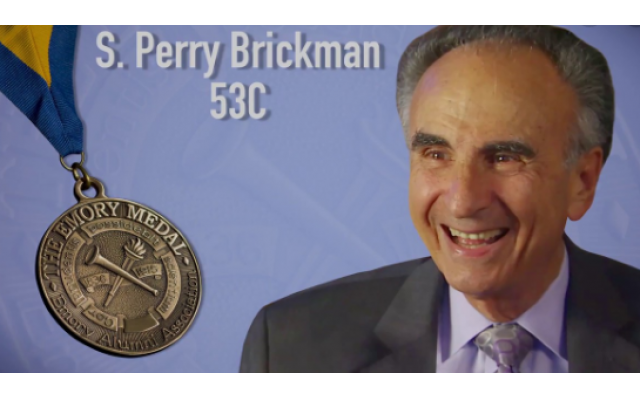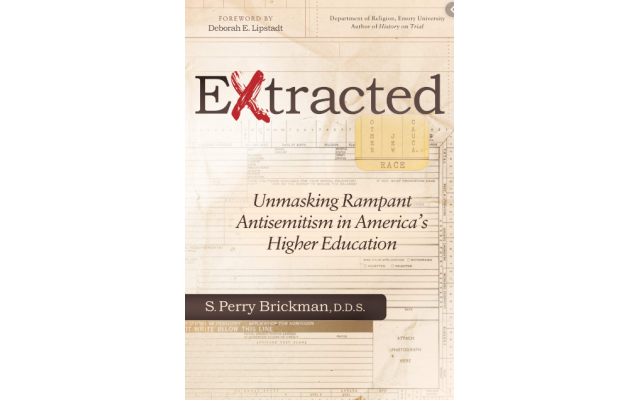Brickman Sums Up Work on Anti-Semitism at Dental School
Perry Brickman has spent the last 13 years researching his new book on anti-Semitism at the Emory Dental School in the 1950s.

Perry Brickman’s new book, “Extracted,” is his summary statement after 13 years of research on the rampant anti-Semitism at the Emory University Dental School in the 1950s. The book tells the story largely based on personal experiences of a number of Jewish students whose dental careers were prematurely ended by an anti-Semitic dean of the school and several other faculty members.
Brickman’s work to uncover what happened at the time led, in 2012, to a full apology by the administration of Emory, an ambitious public relations campaign to rehabilitate the image of the school, and official recognition of Brickman for his tireless efforts to make the truth public.

AJT: For some many years, those involved at that time were silent. Why was that?
Brickman: Before all this became public, people who were forced out of the dental school never talked about it even to their own families. There was this sense of shame. It was, in Yiddish, a shonda or even worse, a busha.
Miles Alexander, who was active in the community for many years, said there were two poles to anti-Semitism in Atlanta. One was the Leo Frank case in 1913 and the other was the Emory dental students in the ‘50s. They were kind of like bookends. For many, many years, no one talked about either. A lot of older people tell me ‘thank you thank you for exposing this.’ We didn’t dare speak about it. It was a terrible time. We were told not to speak about it.
AJT: The silence, as your book points out, was compounded by the actions of powerful Jewish community leaders at the time, to quiet those who wanted to make anti-Semitism at Emory a public issue. How did that happen?
Brickman: It’s really the story of what happened to Art Levin. He is the hero of the story. I spoke to him long after he retired. He was 93 and living in Florida, but he had kept all his records of the work he had done about anti-Semitism at Emory. He and Marvin Goldstein, who was a dentist here, worked together to build an overwhelming body of evidence that implicated Emory.
Levin was with the ADL here. He was here actually at the time The Temple bombing occurred. One of my friends said that he was the bravest man he ever met because of what he did with the Klan. He did all this research in the Emory Dental School at the end of the day, after his job at the ADL during the day finished.
But when he met with the Atlanta Community Relations Committee, they wouldn’t have anything to do with him. They said you’re just making it up, it’s just sour grapes by these dental students. I found it in the minutes of their meetings. The people down at the Federation were mean, very mean.
Emory had two Jewish members of their Board of Visitors; they were the first Jewish members and they were former presidents of the Federation. They had enormous influence in the community and Emory used them to intimidate other Jewish leaders. They sent these guys down to tell Levin to shut up. Basically that’s what they told him. And when he persisted, they had him fired. They literally ran him out of town.
But when I found him in Florida back in 2010, he gave me all his files. Still had them in a closet in his home and that was an enormous help. Eventually the ADL, which had fired him, awarded him their Centennial Medal before he died, for his work. That meant so much to him.
AJT: Are you encouraged by what Emory has done since you made all their misdeeds public?
Brickman: I don’t think the problem of anti-Semitism is ever going to be solved. I’m not talking about just Emory. I mean the problem of anti-Semitism is never going to go away. So we should be vigilant, not just with Emory but everywhere. It’s a problem that’s always going to be with us. And we just have to to be vigilant, and we have to have organizations and we have to have people. And I think that it really is important that they do what needs to be done. That’s what I hope. I would hope that the book would tell you here’s what happened, now try to make sure it doesn’t happen again.
Perry Brickman will speak and sign copies of his book at the Emory University Tam Institute of Jewish Studies at 7 p.m. Sept. 9. He is also scheduled to speak at the Book Festival of the MJCCA Nov. 6.



comments